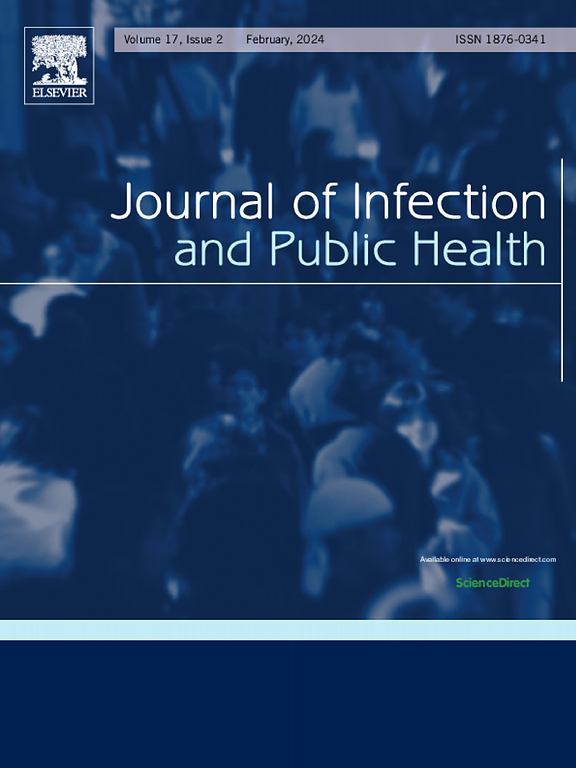Impact of urinary tract infection requiring hospital admission on short-term, mid-term and long-term renal outcomes in adult CKD patients – A potentially modifiable factor for CKD progression
IF 4.7
3区 医学
Q1 INFECTIOUS DISEASES
引用次数: 0
Abstract
Background
Urinary tract infection (UTI) or acute pyelonephritis can lead to renal scarring and impact the subsequent renal function progression. The aims of this study were to investigate the changes in renal function related to UTI requiring hospital admission (UTI/HA) and the association between UTI/HA and long-term renal outcomes in patients with chronic kidney disease (CKD).
Methods
This was a multicenter, retrospective observational study. Renal events and renal function before and after UTI/HA in CKD patients were analyzed for short-term and mid-term renal outcomes. A case-control study with multivariate logistic regression analysis was used to investigate the association between clinical characteristics and risk of long-term renal outcomes (kidney replacement therapy or death, KRT/death) in adult CKD patients.
Results
This study included 1062 adult CKD patients, with 340 KRT and 76 deaths identified during a median follow-up of 105 months. Among 174 patients with UTI/HA, 59 (33.9 %) had bacteremia, 90 (51.7 %) acute kidney injury (AKI), and one in-hospital mortality. There was a faster decline rate of estimated glomerular filtration rate (eGFR) after UTI/HA compared to the pre-UTI/HA period [median (IQR) 0.37 (0.17–0.72) versus 0.19 (0.06–0.36) ml/min/1.73 m2 per month, P < 0.0001]. The incidence of UTI/HA was similar between the KRT/death and the CKD non-dialysis groups. Multivariate logistic regression analysis showed that baseline eGFR, baseline eGFR decline rate and number of hospital admission were significantly associated with an increased risk of KRT/death.
Conclusions
This study highlights the impact of UTI/HA on renal function and renal outcomes in adult CKD patients. It demonstrates a high incidence of in-hospital AKI but low mortality, and accelerated deterioration of renal function following UTI/HA. Long-term renal outcomes were influenced by the baseline renal function and progression rate, and the frequency of hospital admission. UTI/HA may be regarded as a potentially modifiable factor for CKD progression. However, there is a need for further analysis to isolate the impact of UTI/HA from pre-existing renal function decline on long-term renal outcomes.
需要住院的尿路感染对成年CKD患者短期、中期和长期肾脏预后的影响——CKD进展的一个潜在可改变因素
背景尿路感染(UTI)或急性肾盂肾炎可导致肾脏瘢痕形成并影响随后的肾功能进展。本研究的目的是调查尿路感染需要住院治疗(UTI/HA)的肾功能变化,以及慢性肾脏疾病(CKD)患者UTI/HA与长期肾脏预后之间的关系。方法本研究为多中心回顾性观察性研究。对CKD患者UTI/HA前后的肾脏事件和肾功能进行短期和中期肾脏结局分析。一项采用多变量logistic回归分析的病例对照研究用于调查成人CKD患者临床特征与长期肾脏结局(肾脏替代治疗或死亡,KRT/死亡)风险之间的关系。结果本研究包括1062名成人CKD患者,在中位随访105个月期间发现340例KRT和76例死亡。174例UTI/HA患者中,59例(33.9 %)有菌血症,90例(51.7 %)有急性肾损伤,1例住院死亡。与UTI/HA前相比,UTI/HA后估计肾小球滤过率(eGFR)下降速度更快[中位数(IQR) 0.37 (0.17-0.72) vs 0.19 (0.06-0.36) ml/min/1.73 m2 /月,P <; 0.0001]。KRT/死亡组和CKD非透析组之间UTI/HA的发生率相似。多因素logistic回归分析显示,基线eGFR、基线eGFR下降率和住院次数与KRT/死亡风险增加显著相关。结论:本研究强调了UTI/HA对成人CKD患者肾功能和肾脏结局的影响。它表明院内AKI发病率高,但死亡率低,UTI/HA后肾功能加速恶化。长期肾脏预后受基线肾功能、进展率和住院次数的影响。UTI/HA可能被视为CKD进展的潜在可改变因素。然而,需要进一步分析将尿路感染/HA与先前存在的肾功能下降对长期肾脏预后的影响分离出来。
本文章由计算机程序翻译,如有差异,请以英文原文为准。
求助全文
约1分钟内获得全文
求助全文
来源期刊

Journal of Infection and Public Health
PUBLIC, ENVIRONMENTAL & OCCUPATIONAL HEALTH -INFECTIOUS DISEASES
CiteScore
13.10
自引率
1.50%
发文量
203
审稿时长
96 days
期刊介绍:
The Journal of Infection and Public Health, first official journal of the Saudi Arabian Ministry of National Guard Health Affairs, King Saud Bin Abdulaziz University for Health Sciences and the Saudi Association for Public Health, aims to be the foremost scientific, peer-reviewed journal encompassing infection prevention and control, microbiology, infectious diseases, public health and the application of healthcare epidemiology to the evaluation of health outcomes. The point of view of the journal is that infection and public health are closely intertwined and that advances in one area will have positive consequences on the other.
The journal will be useful to all health professionals who are partners in the management of patients with communicable diseases, keeping them up to date. The journal is proud to have an international and diverse editorial board that will assist and facilitate the publication of articles that reflect a global view on infection control and public health, as well as emphasizing our focus on supporting the needs of public health practitioners.
It is our aim to improve healthcare by reducing risk of infection and related adverse outcomes by critical review, selection, and dissemination of new and relevant information in the field of infection control, public health and infectious diseases in all healthcare settings and the community.
 求助内容:
求助内容: 应助结果提醒方式:
应助结果提醒方式:


